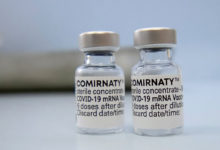Canadians shouldn’t shop around for vaccines with higher efficacy rates, experts say

The approval of a fourth vaccine in Canada should not give Canadians the green light to hold off on getting inoculated in order to wait for other doses with higher efficacy rates, medical experts say.
Pfizer to accelerate COVID-19 vaccine deliveries as Health Canada approves 4th vaccine
That attitude will end up lengthening the time it takes to get the pandemic under control, said Dr. Peter Juni, scientific director of Ontario’s COVID-19 Science Advisory Table.
“If people start to do that, they actually prevent Canadians from moving slowly back to normal,” he said.
On Friday, Health Canada approved the use of Johnson & Johnson’s COVID-19 vaccine. This is the fourth vaccine approved along with shots from Pfizer-BioNTech, Moderna and AstraZeneca-Oxford.
Different efficacy rates
Each vaccine has a different efficacy rate. Vaccine efficacy refers to the percentage reduction of disease in a vaccinated group of people compared to an unvaccinated group, under ideal conditions.
Pfizer-BioNtech and Moderna both have been determined by Health Canada to have efficacy rates of around 95 per cent. AstraZeneca-Oxford has an efficacy rate of 62 per cent while Johnson & Johnson has an efficacy rate of 66.9 per cent.
Despite different efficacies, trials have shown that those who did become infected after getting vaccinated experienced only mild illness, said Dr. Sumon Chakrabarti, an infectious disease specialist in Mississauga, Ont.
Of the thousands of participants in trials for the vaccines, not a single person who received a shot died or was hospitalized from COVID-19, he told The Canadian Press.
Dr. Zain Chagla, an infectious diseases physician at St. Joseph’s Healthcare Hamilton, said debates over efficacy are going to be part of the challenge of getting people vaccinated.
“I think there is obviously something we have to deal with here,” he said.
Some of that could have been sparked by confusion over the messaging of the AstraZeneca-Oxford vaccine. Canada’s National Advisory Committee on Immunization (NACI) has recommended against using that vaccine in people aged 65 and older “due to limited information” on its efficacy in that age group.
In Europe, French and German officials are reversing their initial hesitancy about AstraZeneca and are now urging people to take the vaccine. There are reports that many in Germany have declined the AstraZeneca shot over concerns it may not work as well as others.
Detroit turned down Johnson & Johnson
In Detroit, Mayor Mike Duggan last week turned down 6,200 doses of the Johnson & Johnson vaccine, saying he favoured shots from Pfizer and Moderna for now.
Juni said long-term care homes are the only settings where it makes sense to use the highest efficacy vaccines, as residents are at extreme risk.
For most people, “there is no such thing as a bad vaccine,” he said.
Juni compared the differences in efficacy to high octane versus low octane gas. Most engines, he said, just need gas.
“But obviously in the situation we’re in right now, if you actually are about to run out of gas, you just take whatever is coming that actually works.”
Waiting for a preferred vaccine is just too risky, Chagla said. “You don’t want to be that person with zero per cent protection going into COVID-19 when you could be someone with at least 60 to 70 per cent protection, if not higher.”
‘Just take it’
“You would rather start the clock with some protection rather than no protection,” Chagla said.
Given the opportunity to get vaccinated, he offered some blunt advice: “Just take it.”
Dr. Susy Hota, medical director for infection prevention and control at University Health Network in Toronto, said for those concerned about different efficacy rates, it’s important to know it’s not quite an apples-to-apples comparison because the clinical trials of vaccines were carried out differently.
Chakrabarti said the timing of the trials may have impacted efficacy. Pfizer and Moderna tested their products when the COVID burden was relatively lower in parts of the world. Johnson & Johnson and AstraZeneca, meanwhile, had their trials later when more transmissible coronavirus variants were spreading at a rapid pace.
What shouldn’t be lost, Hota said, is the overall goal of getting vaccinated which is to protect the most vulnerable from getting COVID-19 and to get us out of this pandemic.
‘Not justifiable’
That means, with the vaccine rollout being such a massive undertaking including: vaccine availability, vaccine prioritization schemes and vaccine registries, vaccine preference should not be a consideration.
“[If] you have to deal with people wanting to make decisions based on preference. It’s just, first of all, not justifiable … but really not feasible,” Hota said.
She said people jabbed with higher efficacy vaccines are less likely to suffer from mild symptoms if they were to be infected, and on an individual level, if you don’t want to get sick at all, “that might be a better decision for you.”
“On a public health sort of population level, I would be very disappointed if people felt that was OK and it wasn’t going to cause any harm because we do need to get to a point to immunize as many people as quickly as possible to make gains in managing the pandemic itself.”

Dr. Supriya Sharma, Health Canada’s chief medical adviser, said on Friday that vaccination with a vaccine with 66 per cent efficacy does not mean a person will have a 34 per cent chance of contracting COVID-19.
“While each of the vaccines Health Canada has authorized has different efficacy numbers, the reality is that you will have a greatly reduced chance of getting COVID-19 with any of the … vaccines that have been authorized,” Sharma said.
She drove home that point earlier this week, telling CBC’s The National that her message to Canadians is that when it’s their turn, “you roll up your sleeve” and “take the vaccine that’s offered to you.
“And that will help all of us bring down the COVID-19 numbers across Canada, which is the most important thing that we’re trying to do.”








Redes Sociais - Comentários